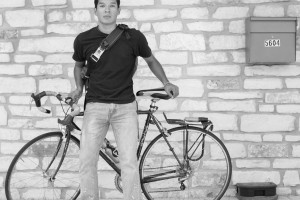 In our celebrity obsessed culture, it’s easy to forget that the lives of everyday people have interest and value. Austin, Texas has built a reputation on the cultural capital of its live music scene and the many artists and “keeping it weird” citizens that make it a funky oasis in a very conservative state. The Invisible in Austin: Life and Labor in an American City collaborative book project (edited by Dr. Javier Auyero) looks at another side of the phenomenal growth and relentless drone of Austin’s self-promotion. From the website:
In our celebrity obsessed culture, it’s easy to forget that the lives of everyday people have interest and value. Austin, Texas has built a reputation on the cultural capital of its live music scene and the many artists and “keeping it weird” citizens that make it a funky oasis in a very conservative state. The Invisible in Austin: Life and Labor in an American City collaborative book project (edited by Dr. Javier Auyero) looks at another side of the phenomenal growth and relentless drone of Austin’s self-promotion. From the website:
Born out of a graduate seminar at the University of Texas, twelve graduate students—inspired and sometimes disturbed by the academic work on poverty in the Americas—set forth to create something different. We initially called ourselves the “OSA group”, referencing our interest in the “other side of Austin.”
This collective enterprise was not the product of a clearly defined research project, but what we came to see as an intellectual adventure. We read extensively, brainstormed over potluck dinners and started to get to know the people that would become the inspiration for each chapter.
Invisible in Austin launches at Book People on Friday, September 4th and will be a major event, just the beginning of talks held on campus and in schools around Austin that will take the project into classrooms and onto book club reading lists (like Senator Kirk Watson’s, for example). The word is spreading fast, Publisher’s Weekly put it on the August 31 pick of the week list. It’s heartening to see how interested people are in the stories of those who are being pushed aside in the mad rush of gentrification.
I asked three of the book’s co-authors (Caitlyn Collins, Katie Jensen and Marcos Perez) how the project continues to inform their experience of Austin, collaborative authorship and continuing friendships with the people who opened their lives to this ethnography. I found the stories to be compelling and compassionate portrayals of fellow citizens who are giving us the opportunity to engage our humanity.
I asked them what stayed with them the most from the interviews and their connections with the person they wrote about:
Marcos Perez – Manuel: The Luxury of Defending Yourself
One of the most gratifying aspects of doing ethnography is that you really get to know people. Ethnography gives you the opportunity to learn about people’s ideals, history, fears and hopes. Every individual life is a complex mix of events, contexts and dispositions, and the methodologies we used in the book allowed us to capture that. In the case of Manuel, I was amazed from the very beginning by his capacity to overcome barriers, and by his enthusiasm in helping others overcome obstacles as well. My interviews with him also reminded me that people cannot be limited to one category: only half of the time in our meetings dealt with immigration and activism. The other half we talked about countless other topics, from sports to travel plan to family to school.
Katie Jensen – Kumar: Driving in the Nighttime
What stays with me the most from my interviews with Kumar is the warmth, kindness and generosity of Kumar and his family. When I first met Kumar and asked if I could interview him as part of a project about Austin, he was affirmative –“Yes, yes, that’s good”– and yet unconcerned with what I was going to ask him about. He simply wanted someone to help him with his English; his night schedule as a taxi driver made it difficult to attend formal classes. He had little concern for what was the trade. And, as a former teacher and professor in Nepal, he is very used to answering questions! Our meetings followed a predictable pattern; first we’d discuss English while drinking Nepalese coffee, and then I asked him my questions as we ate dinner. For the first few times that we met, I kept waiting for the other shoe to drop. I waited for him to change his mind about opening up his home and his life to me, to decide it was too invasive, not worth it to share so much with a stranger. But that never happened. Instead, Kumar, Manu, Sobika, and Rabin continued to welcome me. I have eaten more meals with Kumar and his family than I can count. I have celebrated their holy days with them. Even now, long after the interviews finished, I’m still in touch with Kumar and his children. Kumar always asks me how my studies are going. They’ve even invited me to go to Nepal with them year after next. Once Kumar is eligible for U.S. citizenship, he will be able to return to his home country for the first time since he fled. That will be a very joyous day.
Caitlyn Collins – Raven: “The Difference between a Cocktail Waitress and a Stripper? Two Weeks”
 I continue to be astounded by Raven’s strength, poise, and optimistic outlook given all that she has witnessed and overcome. Her stubborn positivity really struck me. What stays with me the most is our friendship; I really value our coffee dates, happy hours, and chats over pancake breakfasts that we’ve continued since our interviews came to a close. I feel lucky to watch her life unfold as time passes, and am even happier to report that she is in a stable job and happy partnership now. She shared so much with me that made it into the book, and I hope she has a sense for how powerful that act of sharing can be for others who read her words. I really feel honored to be able to tell her story.
I continue to be astounded by Raven’s strength, poise, and optimistic outlook given all that she has witnessed and overcome. Her stubborn positivity really struck me. What stays with me the most is our friendship; I really value our coffee dates, happy hours, and chats over pancake breakfasts that we’ve continued since our interviews came to a close. I feel lucky to watch her life unfold as time passes, and am even happier to report that she is in a stable job and happy partnership now. She shared so much with me that made it into the book, and I hope she has a sense for how powerful that act of sharing can be for others who read her words. I really feel honored to be able to tell her story.
Has it changed the way they look at Austin?
Katie Jensen: I think more than change the way I look at Austin – which, even after four years, still does not feel like “my” town – it has expanded my understanding of the city. Hearing and reading about the eleven individuals who fill the pages of Invisible in Austin over the course of years, who are rich in details beyond those which could fit into our chapters, very much changed the level of detail with which I see the city and imagine it in my mind. I cannot hear about or drive by a W hotel without thinking of Ethan and his life trajectory. I cannot pass by a domestic cleaning service car without thinking of Xiomara and her family. I cannot think of a storage unit without remembering Clarissa. When I fret about gentrification in Austin, I remember the tour de force that’s Ella. I cannot see an office printer without wondering about Chip and his health. And in this way, these labor fields or social groups become more than vague entities in my mind but filled with the lived experiences of real people. All of which have had lives, as Kumar says, not like a straight line, but “like the way a snake moves.”
Caitlyn Collins: I don’t sense that it has changed my outlook on Austin (I walk around with my sociology brain turned on constantly — too often, really), but I get the feeling that it will really change OTHER people’s outlook, and I am really excited about that. The first responses we’ve gotten from folks here have been overwhelmingly positive and people seem to respond strongly to the stories we tell. I think this momentum will only grow as we start doing talks and panels around town in the coming months, and as it is taught in undergraduate and graduate classes hopefully nationwide.
Marcos Perez: One of the first titles we considered for the book was “Through Their Eyes”. We eventually decided against it, but the phrase still conveys how many felt about the project’s main contribution: we are able to see the city through the eyes of eleven people. The chapters in the book (and the amazing photographs taken by Eva and Julia) hopefully will have the effect of making it impossible to see the city the same way after reading each of them. You cannot see aspects of urban life the same way, now that you know how they look from the perspective of others.
Will you consider creating another collaborative book project in the future?
Marcos Perez: Oh, yeah. I hope that projects like these continue at the Ethno Lab after the current cohort of students has graduated. And I sincerely expect that we will do a similar project from our new positions at different universities across the nation and the world.
Caity Collins: Absolutely. This project makes me believe even more in the beauty, power, and strength of collaborative ethnography. None of us on our own could have done this project – this was truly an instance of the total being greater than the sum of its parts.
Katie Jensen: It’s my hope that as the graduate students become professors, we may be able to repeat such a project in the future cities we will call home. Nothing in my life has taught me as much as this book about writing and treating with care and respect those who share their lives with us. We spent years together reading about interviewing, about social suffering, about the “creative class;” conducting interview after interview after interview; crafting narratives from those many hours of interviews; and finally figuring out the particular themes around which those narratives would hinge. During all that time, listening to Javier and the other graduate students (and probably talking too much), I came to more deeply understand the great responsibility we have as sociologists — to write well, to do justice to those we write about, and to try as hard as possible to make the book impact others in some of the ways it has impacted us.
As I read the book, I hear each chapter in the voice of its author. It conveys the intimacy and nuanced experience of storytelling and keeps me wondering how the people in these stories are doing . It is a testament to the personal commitment of the authors and the individuals who are portrayed in the book. This is how we share the best of what our community has to offer and how what starts here changes the world.


